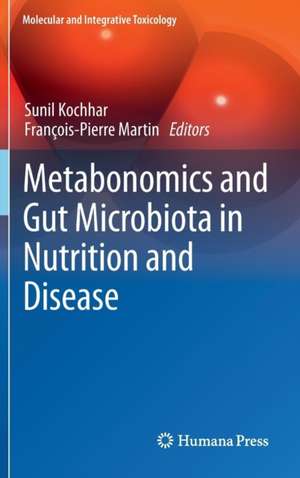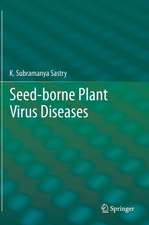Metabonomics and Gut Microbiota in Nutrition and Disease: Molecular and Integrative Toxicology
Editat de Sunil Kochhar, François-Pierre Martinen Limba Engleză Hardback – 5 noi 2014
The rise in multifactorial disorders, the lack of understanding of the molecular processes at play and the needs for disease prediction in asymptomatic conditions are some of the many questions that system biology approaches are well suited to address. Achieving this goal lies in our ability to model and understand the complex web of interactions between genetics, metabolism, environmental factors and gut microbiota. Being the most densely populated microbial ecosystem on earth, gut microbiota co-evolved as a key component of human biology, essentially extending the physiological definition of humans.
Major advances in microbiome research have shown that the contribution of the intestinal microbiota to the overall health status of the host has been so far underestimated. Human host gut microbial interaction is one of the most significant human health considerations of the present day with relevance for both prevention of disease via microbiota-oriented environmental protection as well as strategies for new therapeutic approaches using microbiota as targets and/or biomarkers. In many aspects, humans are not a complete and fully healthy organism without their appropriate microbiological components. Increasingly, scientific evidence identifies gut microbiota as a key biological interface between human genetics and environmental conditions encompassing nutrition. Microbiota dysbiosis or variation in metabolic activity has been associated with metabolic deregulation (e.g. obesity, inflammatory bowel disease), disease risk factor (e.g. coronary heart disease) and even the aetiology of various pathologies (e.g. autism, cancer), although causal role into impaired metabolism still needs to be established.
Metabonomics and Gut Microbiota in Nutrition and Disease serves as a handbook for postgraduate students, researchers in life sciences or health sciences, scientists in academic and industrial environments working in application areas as diverse as health, disease, nutrition, microbial research and human clinical medicine.
| Toate formatele și edițiile | Preț | Express |
|---|---|---|
| Paperback (1) | 721.40 lei 6-8 săpt. | |
| SPRINGER LONDON – 10 sep 2016 | 721.40 lei 6-8 săpt. | |
| Hardback (1) | 727.97 lei 6-8 săpt. | |
| SPRINGER LONDON – 5 noi 2014 | 727.97 lei 6-8 săpt. |
Din seria Molecular and Integrative Toxicology
- 5%
 Preț: 1113.83 lei
Preț: 1113.83 lei - 5%
 Preț: 1462.18 lei
Preț: 1462.18 lei - 5%
 Preț: 1099.20 lei
Preț: 1099.20 lei - 5%
 Preț: 1094.16 lei
Preț: 1094.16 lei - 5%
 Preț: 788.14 lei
Preț: 788.14 lei - 5%
 Preț: 1424.89 lei
Preț: 1424.89 lei - 5%
 Preț: 1102.67 lei
Preț: 1102.67 lei - 5%
 Preț: 1301.22 lei
Preț: 1301.22 lei - 5%
 Preț: 1431.30 lei
Preț: 1431.30 lei - 5%
 Preț: 1106.86 lei
Preț: 1106.86 lei - 5%
 Preț: 1110.17 lei
Preț: 1110.17 lei - 5%
 Preț: 1292.67 lei
Preț: 1292.67 lei - 5%
 Preț: 1100.64 lei
Preț: 1100.64 lei - 5%
 Preț: 1301.24 lei
Preț: 1301.24 lei - 5%
 Preț: 736.20 lei
Preț: 736.20 lei - 5%
 Preț: 1090.97 lei
Preț: 1090.97 lei - 5%
 Preț: 1102.54 lei
Preț: 1102.54 lei - 5%
 Preț: 1024.03 lei
Preț: 1024.03 lei
Preț: 727.97 lei
Preț vechi: 766.28 lei
-5% Nou
Puncte Express: 1092
Preț estimativ în valută:
139.32€ • 144.91$ • 115.01£
139.32€ • 144.91$ • 115.01£
Carte tipărită la comandă
Livrare economică 12-26 aprilie
Preluare comenzi: 021 569.72.76
Specificații
ISBN-13: 9781447165385
ISBN-10: 1447165381
Pagini: 392
Ilustrații: XVI, 375 p. 54 illus., 43 illus. in color.
Dimensiuni: 155 x 235 x 30 mm
Greutate: 0.72 kg
Ediția:2015
Editura: SPRINGER LONDON
Colecția Springer
Seria Molecular and Integrative Toxicology
Locul publicării:London, United Kingdom
ISBN-10: 1447165381
Pagini: 392
Ilustrații: XVI, 375 p. 54 illus., 43 illus. in color.
Dimensiuni: 155 x 235 x 30 mm
Greutate: 0.72 kg
Ediția:2015
Editura: SPRINGER LONDON
Colecția Springer
Seria Molecular and Integrative Toxicology
Locul publicării:London, United Kingdom
Public țintă
ResearchCuprins
Introduction to Metabolomics in systems biology research.- Metabolomics in clinical practice.-Adopting multivariate non-parametric tools to determine genotype-phenotype interactions in health and disease.- Metabolomics in Translational Research for Personalized Medicine and Nutrition.- Can we use Metabolomics to Understand Changes to Gut Microbiota Populations and Function? A Nutritional Perspective.- Automated annotation of microbial and human flavonoid derived metabolites.- Metabonomics in neonatal and paediatric research: Studying and modulating gut functional ecology for optimal growth and development.- Metabolomics and Milk: the Development of the Microbiota in Breast Fed Infants.- Metabonomics and gut microbial paradigm in healthy ageing.- Roles of herbal medicine in modulating gut microbiota associated with health and diseases.- Gut microbiota and metabolic diseases: from pathogenesis to therapeutic perspective.- Role of microbiota in regulating host lipid metabolism and disease risk.- Role of the Gut Microbiota in Maintaining GI Health: Highlights on Inflammatory Bowel Disease.- Deciphering the gut microbial contribution to the aetiology of autism development.- The Modulation of Drug Efficacy and Toxicity by the Gut Microbiome.- Understanding the benefits of bariatric surgery on gut physiology: implications for obesity, type 2 diabetes and cardiovascular disease
Textul de pe ultima copertă
This book provides a comprehensive overview of metabonomics and gut microbiota research from molecular analysis to population-based global health considerations. The topics include the discussion of the applications in relation to metabonomics and gut microbiota in nutritional research, in health and disease and a review of future therapeutical, nutraceutical and clinical applications. It also examines the translatability of systems biology approaches into applied clinical research and to patient health and nutrition.
The rise in multifactorial disorders, the lack of understanding of the molecular processes at play and the needs for disease prediction in asymptomatic conditions are some of the many questions that system biology approaches are well suited to address. Achieving this goal lies in our ability to model and understand the complex web of interactions between genetics, metabolism, environmental factors, and gut microbiota. Being the most densely populated microbial ecosystem on earth, gut microbiota co-evolved as a key component of human biology, essentially extending the physiological definition of humans.
Major advances in microbiome research have shown that the contribution of the intestinal microbiota to the overall health status of the host has been so far underestimated. Human host gut microbial interaction is one of the most significant human health considerations of the present day with relevance for both prevention of disease via microbiota-oriented environmental protection as well as strategies for new therapeutic approaches using microbiota as targets and/or biomarkers. In many aspects, humans are not a complete and fully healthy organism without their appropriate microbiological components. Increasingly, scientific evidence identifies gut microbiota as a key biological interface between human genetics and environmental conditions encompassing nutrition. Microbiota dysbiosis or variation in metabolic activity has been associated with metabolic deregulation (e.g. obesity, inflammatory bowel disease), disease risk factor (e.g. coronary heart disease) and even the aetiology of various pathologies (e.g. autism, cancer), although causal role into impaired metabolism still needs to be established.
Metabonomics and Gut Microbiota in Nutrition and Disease serves as a handbook for postgraduate students, researchers in life sciences or health sciences, scientists in academic and industrial environments working in application areas as diverse as health, disease, nutrition, microbial research and human clinical medicine.
The rise in multifactorial disorders, the lack of understanding of the molecular processes at play and the needs for disease prediction in asymptomatic conditions are some of the many questions that system biology approaches are well suited to address. Achieving this goal lies in our ability to model and understand the complex web of interactions between genetics, metabolism, environmental factors, and gut microbiota. Being the most densely populated microbial ecosystem on earth, gut microbiota co-evolved as a key component of human biology, essentially extending the physiological definition of humans.
Major advances in microbiome research have shown that the contribution of the intestinal microbiota to the overall health status of the host has been so far underestimated. Human host gut microbial interaction is one of the most significant human health considerations of the present day with relevance for both prevention of disease via microbiota-oriented environmental protection as well as strategies for new therapeutic approaches using microbiota as targets and/or biomarkers. In many aspects, humans are not a complete and fully healthy organism without their appropriate microbiological components. Increasingly, scientific evidence identifies gut microbiota as a key biological interface between human genetics and environmental conditions encompassing nutrition. Microbiota dysbiosis or variation in metabolic activity has been associated with metabolic deregulation (e.g. obesity, inflammatory bowel disease), disease risk factor (e.g. coronary heart disease) and even the aetiology of various pathologies (e.g. autism, cancer), although causal role into impaired metabolism still needs to be established.
Metabonomics and Gut Microbiota in Nutrition and Disease serves as a handbook for postgraduate students, researchers in life sciences or health sciences, scientists in academic and industrial environments working in application areas as diverse as health, disease, nutrition, microbial research and human clinical medicine.
Caracteristici
Overview of state-of-the art approaches to capture host and gut microbial transgenomic interactions, to enable readers to integrate host omics together with gut microbiome related data Comprehensive review of major advances, novel insights and mechanistic hypotheses developed in the field of nutrition to promote health and nutritional status in human populations Examines the translatability of systems biology approaches into applied clinical research and to patient health and nutrition




